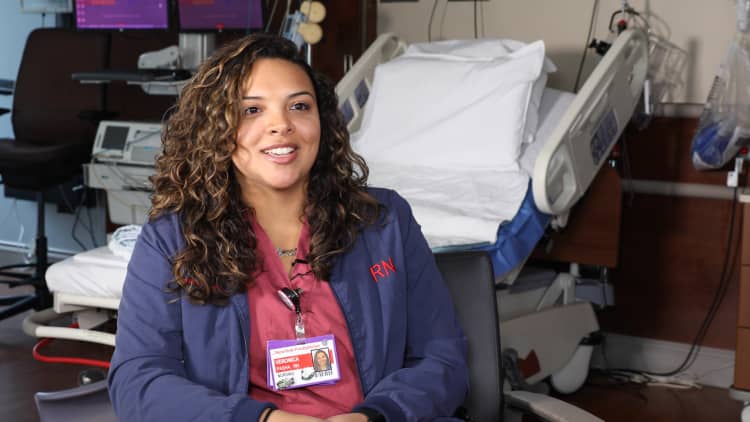Veronica Pasha's work day starts early: She's up at 5 a.m. and leaves her apartment in Queens shortly after 6 a.m. That gives her enough time to make a 6:15 a.m. bus, which gets her to the subway station at 6:22 a.m.
By 7 a.m., she's at NewYork–Presbyterian, where she's been working as a registered nurse since 2015. It's her first job. After graduating with a degree in nursing from Hunter College in 2015, Pasha was hired as a staff nurse in the women and children's health division. Last fall, she was promoted to senior staff nurse.
The 25-year-old New York native is a float nurse, which means she works across all units of her division. She's also one of the sexual assault forensic examiners in the ER, which means that "three shifts a month, I'm on call to come in for sexual assault and domestic violence victims that come in through the emergency room," she says.
CNBC Make It stopped by the hospital to meet Pasha and get a feel for what it's really like to be a registered nurse.
The hours
Pasha works 13 shifts a month, or about three to four per week. Each shift is 12.5 hours — 7:30 a.m. to 8 p.m. — "but sometimes you get stuck here if you have charting to do," she adds. "Or, if the unit is short, we'll offer to stay later. The maximum we could work [in one day] is 16 hours."
There's also a weekend requirement: Three of her 13 monthly shifts have to be on a Saturday or Sunday.
The nurses at NewYork–Presbyterian set their own schedules about 45 days in advance, "so in terms of life planning and things like that, you have to really plan ahead," says Pasha.
The longer you've been at the hospital, the more say you have when it comes to your schedule, she says: "For staff nurses on the floor, seniority is definitely the biggest thing. You get your first pick of vacations and when you want your holidays and when you want to be off. When you're new, you just kind of get whatever is left at the end."
The shift
Pasha arrives at the hospital between 7 and 7:15 a.m. to change into her scrubs and pick a patient for the day. "If I want to be an OR nurse today, I'll sign up for the OR. If I want to be in the recovery room, I'll go there," she says.
After clocking in at 7:30 a.m., "we do our change of shift sign-out," says Pasha, which is when the residents, attendings, members of the anesthesia team and nurses meet to review the status of each patient. "We go over every patient that's on the board that morning. We go through what part of the labor they're in, what part of the postpartum phase that they're in, if they're recovering, if they're a labor patient and going to the OR."
Then, she checks in with her patients that day — she could have anywhere from one to five — and creates a plan with them.
"It's hard to put together what you'll do on a day-to-day because you just don't really know what you're walking into that day," says Pasha. Plus, since she's a float nurse, she works in different units: postpartum, antepartum or labor and delivery.
If she's working on postpartum or antepartum, her day will typically be more structured. Postpartum, for example, "is a lot of breastfeeding support, a lot of newborn care, educating new families on what to expect and what to not expect and how to how to change diapers and bathe the baby — things like that."
Labor and delivery, though, "is just so hectic and crazy," she says. "There's no real structure."
It's hard to put together what you'll do on a day-to-day because you just don't really know what you're walking into that day.Veronica Pasharegistered nurse at NewYork–Presbyterian
Depending on the day, she might have time to take a lunch break or catch up with colleagues, she says, though, "other days are just so busy you don't have time to sit down for two seconds." Pasha, who meal preps and packs all of her food for the day, says that the goal is to eat all three meals at the hospital, but "on a busy day, I'll come with all my food and leave with all my food."
On those days, "you throw a grape in your mouth and you run back to your to your patient."
It's not until her shift is over when the fatigue hits her: "As soon as I sit on the subway to go back home, I'm like, 'Wow, I'm tired.'" As exhausting as the days can be, "you have to really keep a strong face on, especially for a mom that's laboring. Because when she's tired, you need to be the energizer. ... By the time I get home, I shower and I'm in bed very, very quickly."
The pay
Pasha gets paid hourly. If she works overtime, she makes time and a half.
"For every year that you work in the position that you're in, you do get a raise," she says. "And then if you get a promotion — for example, just this fall, I was promoted from staff nurse to senior staff nurse — you get a bump in your hourly rate also."
Pay varies by region of the country. In New York City, for example, the average salary of a registered nurse is $83,665, according to Glassdoor. In Chicago, it's $66,322 and in Los Angeles, it's $87,648.
Pasha, who got her Bachelor of Science in nursing at Hunter College in New York, is also working on getting her master's in public administration. Hunter cost her about $37,000 total, while her master's degree "costs me about $60,000," she says, adding: "NewYork–Presbyterian has helped me fund a lot of my master's degree, so it's not so bad, but loans are definitely a real thing."
The best part of the job
"The most rewarding part is definitely the patients and creating that rapport with them," says Pasha. "Especially in this specific area of labor and delivery, you're fostering a family and you're bringing a child into the world and you're creating a family. … There's no other better feeling."
The hardest part of the job
While Pasha is helping new families, she sometimes misses out on her own family events. After all, the hospital doesn't close.
"The hardest part about my job is being away from my family, especially during holidays or graduations and birthdays," she says. "I FaceTime them but it's different when you're physically not there to be with them."
Nursing can be stressful, she adds: "Especially in labor and delivery, you have two lives — you have a mom and you have a baby — and it can be terrifying. When that baby's heart rate goes down, my heart goes down. It drops and I get nauseous and you freak out, but you have to keep a very confident face on because the mom or the family or whoever is there, they look at you."
In labor and delivery, you have two lives — you have a mom and you have a baby — and it can be terrifying. When that baby's heart rate goes down, my heart goes down.Veronica Pasharegistered nurse at NewYork–Presbyterian
The biggest misconceptions
As a nurse, you're doing much more than giving medications and cleaning patients, "which is kind of what all the medical shows portray," says Pasha.
"That can be really frustrating because you're such a critical aspect to a patient's care. You're the person that's at the bedside all day and you're the person that catches those critical moments where a patient says, 'I'm not really feeling myself.'"
Another misconception, specifically for labor and delivery, "is that it's such a happy time and you're around babies all day and that must be super great," she says. "And for the most part, it's a great job and that is how my day is, but on other days, I'm running with a mom to the OR because her baby's heart rate is decelerating or mom has a postpartum hemorrhage and she's bleeding and she just won't stop."
What it takes to be a great nurse
Three specific qualities distinguish the best nurses, says Pasha: Compassion, empathy and being an active listener. "There's a difference between hearing someone speak and really listening to them," she says, "and I think that's something that over time you develop as a nurse."
As with any job, says Pasha, don't be afraid to ask questions: "There's no such thing as a stupid question. I ask the most simple questions all the time that are nursing basics, but you just need that refresher to make sure that you're doing the right thing."
Be open, she adds: "If you would have asked me in college if I wanted to be a labor and delivery nurse, I would've told you, 'Absolutely not. You will not catch me around pregnant women.' This is the first job I've had and I fell in love with it, and I think that's something that future nurses or new nurses need to know — that your interests are going to change once you're actually in the field and you're doing it."
Don't miss: I spent 10 hours shadowing a Delta flight attendant—here's what it's like to lead a crew
Like this story? Subscribe to CNBC Make It on YouTube!




